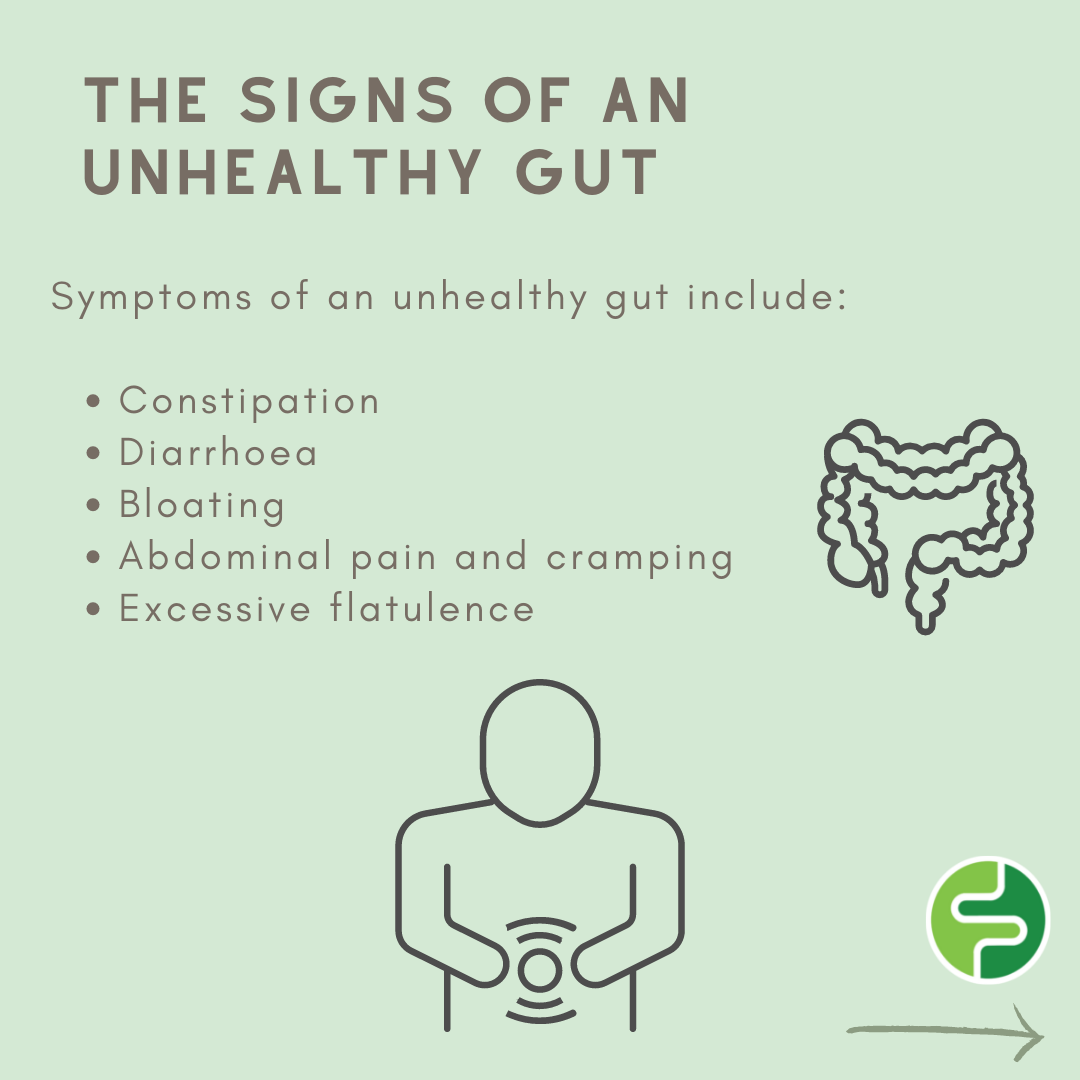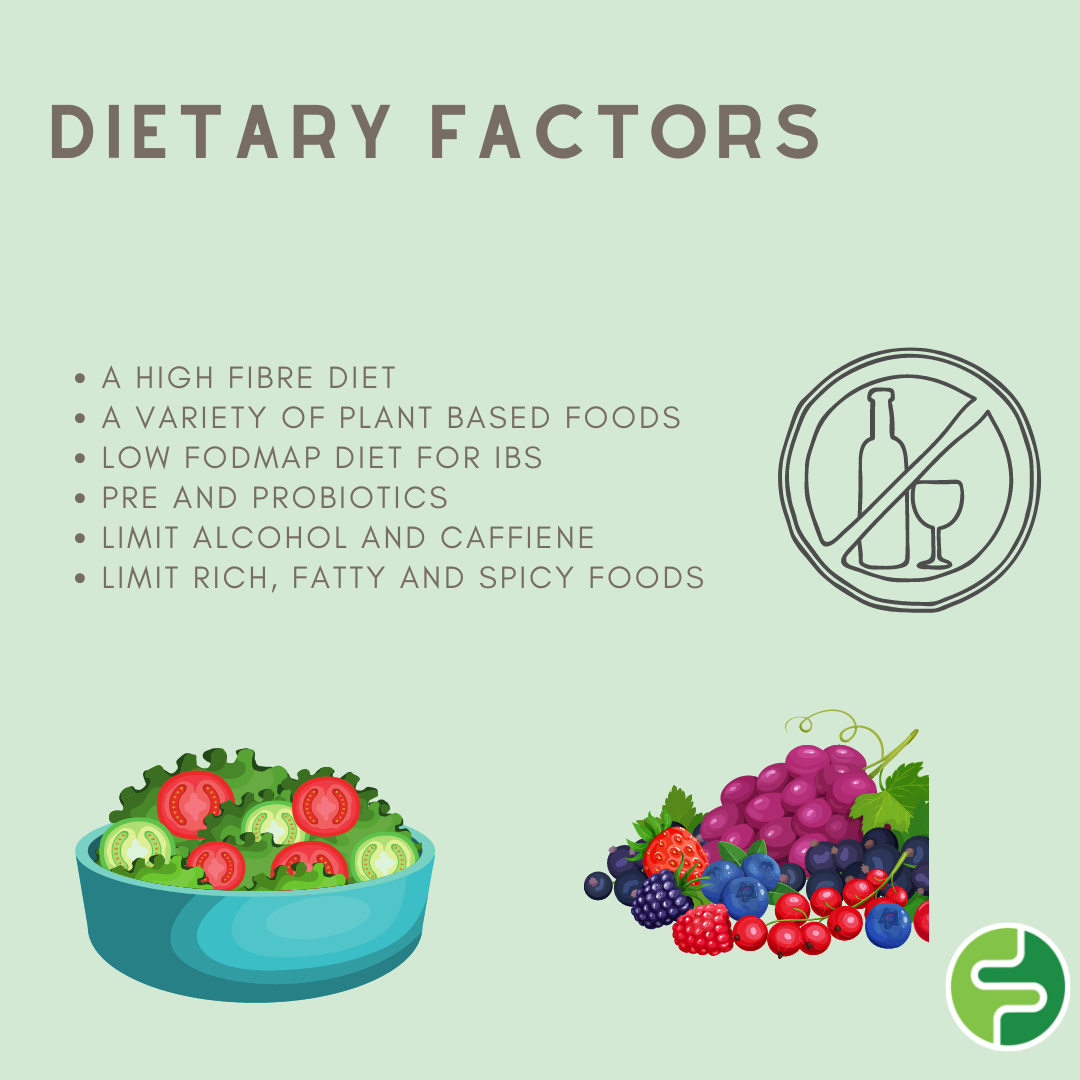What are the signs of an unhealthy gut & how can you improve it?
Posted on February 16, 2022

What is IBS and what are the signs of an unhealthy gut?
Irritable bowel syndrome (IBS) is a gastrointestinal condition meaning it affects the body’s digestive tract. IBS can cause symptoms of an unhealthy gut. These symptoms may include:
– Constipation
– Diarrhoea
– Bloating
– Abdominal pain and cramping
– Excessive flatulence
It is important to note that IBS is not the only cause of gut symptoms and it is important to also consider other possible causes such inflammatory bowel disease (IBD), and Coeliac Disease. Work with your healthcare team for an accurate diagnosis before commencing any treatments or lifestyle changes.
How do I know if my gut symptoms are caused by IBS?
The first step is to see your GP to eliminate other potential medical conditions such as IBD and coeliac disease as some symptoms of other conditions may be similar to IBS symptoms. If all other conditions are eliminated, your doctor will diagnose you with IBS and you can start to work with a gut health specialised Accredited Practising Dietitian to manage your diet and other strategies to improve your gut health.

What can I do to improve and maintain gut health?
Diet
There is no “one size fits all” diet for a healthy gut; the diet that will work for you depends on the cause of your gut symptoms. Some dietary strategies that may help improve the gut microbiome (the amount of good bacteria in the gut) and may reduce gut symptoms include; increasing your fibre intake, including pre and probiotics and incorporating a variety of plant based foods into your diet. It is important to note that these strategies depend on the cause of your gut symptoms and may not be suitable for people with IBS. It is important to work with a gut health qualified dietitian to find the best diet for you.
The Low FODMAP Diet for IBS
The most well researched and evidence-based diet for specific management of IBS is the Low FODMAP Diet. This is a diet low in certain short chain carbohydrates (sugars) that are found in various foods and drinks, which may trigger uncomfortable symptoms such as bloating, constipation, diarrhoea and abdominal pain, in people with IBS. These types of carbohydrates are; Fermentable Oligosaccharide, Disaccharide, Monosaccharide And Polyols (FODMAPs). When trialling a low FODMAP diet you should work with your dietitian who will guide you through the process. The low FODMAP diet involves the initial elimination of FODMAP foods that trigger symptoms, gradual reintroduction of foods to determine tolerance of these foods and then personalisation of a longer-term diet based on tolerance and symptoms. This is explained in more detail below.
Phase 1 Initial low FODMAP phase
The initial phase involves elimination of high FODMAP foods. It is important to work with a dietitian in this phase to ensure you not are not missing out on any important nutrients while eliminating FODMAPs (this means replacing high FODMAP foods with low FODMAP alternatives rather than just cutting out foods all together).The initial phase is usually completed in 2-6 weeks.
Phase 2 Reintroduction phase
This phase involves the gradual reintroduction of the FODMAP foods that were eliminated back into the diet. This aims to find out the amount of different FODMAPs your body can tolerate without triggering IBS symptoms. Your dietitian will figure out the best timing and amount for reintroducing foods for you. The reintroduction phase is usually completed in 6-8 weeks.
Phase 3 Personalisation phase
The final stage is the long-term diet, personalised to the amount of each FODMAP your body can tolerate, based on the previous phases. It is important to note that this phase will be different for each person. For example someone may be triggered by lactose and thus, the recommendation may be to reduce or remove lactose from the diet, while someone else may not be triggered by this particular FODMAP and so they can consume it freely. While this phase of the diet is ongoing and you may feel satisfied with the improvement in symptoms, it is important to remember that FODMAP tolerances can change over time and therefore, you may need to see a dietitian again in the future to re-challenge different foods.
Other dietary tips for gut health
Limiting caffeine and alcohol
As per the Australian Government’s nutrition guidelines, it is recommended to limit your alcohol intake to no more than two standard drinks per day with at least two alcohol free days per week and limit your caffeine intake to less than 3 cups per day (of coffee, tea, cola etc.).
Limit intake of rich, fatty and spicy foods
Foods that are overly rich or fatty such as fast food, chips, and burgers, as well as foods that are very spicy may trigger gut symptoms including diarrhoea and abdominal pain. Therefore it is recommended to limit intake of these foods.
Lifestyle Factors
There are also a number of lifestyle factors that may help to improve overall gut symptoms and maintain your gut health. These include:
Eating habits
Your eating habits and routine can also impact your gut health and symptoms. Taking time to sit down to eat meals and making an effort to relax, eat slowly and chew your food, will ease digestion and stress on the body and mind, which in turn may help reduce gut symptoms around meal times.
Regular exercise
Exercise can improve symptoms such as bloating, constipation and flatulence, as well as improving your overall physical and mental health. The best type of physical activity will vary for individuals and their symptoms but in general many people with gut symptoms will benefit from starting with low intensity aerobic exercise such as walking, cycling and swimming, low weight/body weight training and assessing the impact on gut symptoms before moving to higher intensity activities if you wish. Aim for 30 minutes of intentional exercise each day.
Reducing stress
Your mood and stress levels can also trigger unhealthy gut symptoms and impact gut health. Try to take some time each day to engage in self-care activities that allow you to de-stress and switch off. This may include meditation, reading, taking a bath, going for a walk outside or spending time with a loved one. If you are struggling with stress it may be a good idea to have a chat with a qualified psychologist or therapist.
Psychological therapies
Some psychological therapies can help target the gut-brain axis (that is the relationship between the brain and our gastrointestinal system) and may help to improve gut symptoms. Cognitive behavioural therapy and gut directed hypnotherapy have been shown to be the most effective psychological treatments for gut health. These therapies may be used together with dietary management. Speak to your doctor for a referral to a qualified psychologist.

In Summary
An unhealthy gut can be caused by a variety of conditions and can lead to uncomfortable symptoms such as constipation, diarrhoea, bloating and abdominal pain. Dietary management is the most effective way to improve gut health and ease symptoms. The Low FODMAP diet is the most well researched diet for the management of IBS, which is one of the main causes of an unhealthy gut. Other dietary and lifestyle factors such as regular exercise, reducing stress and psychological therapies may also help to relieve gut symptoms and support in the maintenance of a healthy gut.
If you would like individualised support with dietary management of gut symptoms and improving your gut health please make an appointment with an Accredited Practising Dietitian.
Written by: Meera Mishra, Accredited Practising Dietitian
Reviewed by: Ijmeet Maan, Accredited Practising Dietitian








